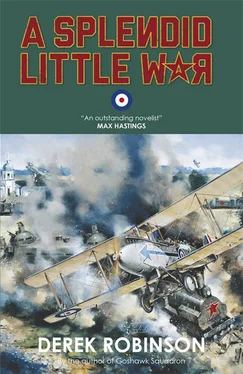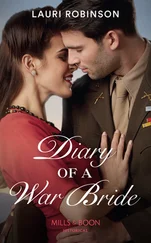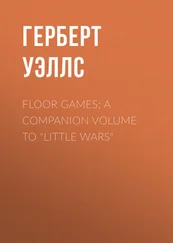A few miles further on, Wragge found the reason for all this nothing-doing. Lengths of track had been torn up and squads of engineers were restoring them. Presumably the Bolos did it. Some holes were big enough for shell craters. Or perhaps dynamite.
The Camels climbed to three thousand feet and spread out, four hundred yards between each, the better to search the land. They saw nothing to defend, no towns, no rivers except the one the railroad followed. It looked half-dried-up and no obstacle to anyone.
They cruised on for ten, twenty miles, looking down at empty countryside and up at empty sky, down again, up again. “Christ!” Dextry said aloud. “This is boring bloody country. Where’s the damn war?” Borodin was not bored. This was his Russia and he was proud of its enormous spaces, there was room to breathe in Russia, more than anywhere in the world. Except perhaps China, but China was full of Chinese who, let’s face it, can’t write War and Peace or paint anything except urns and vases and couldn’t spell Tchaikovsky let alone play him. Jessop was getting a sore neck and wondering what it would be like to be stripped naked for an examination by Flight Lieutenant Perry. Would she have warm fingers? Strong warm fingers? His stomach muscles tightened. Wragge worried what he would do if someone’s engine went on the fritz now. He kept looking for landmarks, something a search party could find. That was when he saw the tents. Brown bell tents, sixty, seventy, maybe more.
He waggled his wings and waved, and as the Flight came together he searched below for a marker. He saw a wood shaped like a broken star: that would do.
He got the Flight between the sun and the camp, and dived. Nobody fired up at them. A handful of men ran. He got a clear view of rows of tents with well-trodden paths between them. The Camels buzzed the camp, low enough to wake the dead. Still no gunfire. As the C.O. pulled out and climbed away he glimpsed stampeding horses, scared by the racket. But no men.
The Camels flew a mile-wide circle around the tents and found nothing. Wragge’s fuel gauge read less than half-full, and it was unreliable. This was not the time or place to meet the Red air force. Combat drank petrol. Nobody wanted that. They headed south.
The landing ground was easy to find: just follow the rail line and find the rusty spur. The field looked wonderfully green, and the C.O. knew that something was badly wrong when he saw a Nine lying flat on its belly and another with its tail high and its nose buried in the grass. He landed, saw Oliphant waiting, taxied towards him, climbed out.
“We got strafed,” Oliphant said. “Ten minutes after you left. Three Spads, not the same bunch you saw, these were black. Caught us on the hop. My chaps did their best to get off the ground, but that one lost its wheels and looks like a pregnant duck, and that one overcooked his throttle so his tail came up too soon and he snapped his prop. Then the troops got the Lewis guns going and scared the Spads away, thank Christ.”
Wragge did some counting. “You’re one short, Tusker.”
“Ah… now for the bad news. Tommy Hopton did manage to get airborne. With Mickey Blythe. Naturally the Spads went for him and there was a hell of a scrap. We watched it all. They got him in the end. Three to one: pretty lousy odds. He was a flamer, Tiger. They both jumped.” He pointed to a distant wood. “Somewhere over there, probably. I’ve got search parties out.”
“Jesus Christ Almighty.”
“They did the right thing, Tiger. Taking off, I mean. Better to be up there than strafed down here. If you’d seen—”
“Yes, of course they did. No question about that. Absolutely the right thing. Tommy Hopton and Mickey Blythe… God help us. If only we’d been here.”
“Then maybe the Spads wouldn’t have come.”
“How did they know?”
Oliphant shrugged. “Spies? Or perhaps just chance.”
Wragge sat on the grass, and so did Oliphant. “I feel knackered, Tusker. And we didn’t find a damn thing except empty tents. We’re losing good men too fast. First Lowe, then Maynard, and now your two chaps do the right thing and…” He couldn’t find words, and gave up.
Already the ground crews were working on the Nines. It would be another long night for them. At dusk the search parties came back, empty-handed. There were tens of thousands of trees, they said, all in full leaf. Maybe they got caught in the branches, maybe not. Who could say?
It was a quiet evening in The Dregs, briefly enlivened when the C.O. came in with Borodin and a smart young Russian officer, heavy with gold braid.
“Gentlemen, this is General Polakov,” he said.
“Pokalov,” Borodin murmured.
“Well, I was close. He has ridden here post-haste with good news. He wishes to address you.”
Pokalov spoke for three minutes. He was brimful of energy and excitement, but it was still a long three minutes. They understood nothing until his final words: “Na Moskvu! ” Borodin led the applause. Pokalov smiled and joined in.
“Please,” Wragge said to Borodin.
“The general congratulates the squadron on its stunning victories, and is proud to announce that the Bolsheviks have retreated to Orel, which with your help General Denikin will now take on his glorious way to Moscow.”
They waited. “Is that all?” Dextry said.
“What he failed to say is that three battalions of the enemy have shot their officers and deserted to join our ranks, and one Cossack cavalry brigade has tired of retreating and gone home. There are indications of a Bolo collapse.”
“Are there?” Jessop said. “Tell that to Tommy Hopton and Mickey Blythe.”
“We must expect casualties,” the C.O. said. “It’s the price we pay for victory.” Nobody applauded that. It had been a hard day and Wragge wanted to put it behind him. “What are Denikin’s plans?” he said to Borodin. “What does he want of us?”
“Ground-strafing at Orel.”
“Sweet blind O’Reilly,” Jessop said. “Haven’t we done our share of that? Strafing fixed defences is bloody dangerous.”
“Look at it this way,” the C.O. said. “One last Big Push and the enemy’s done for.”
“They told us that in France,” Dextry said. “Told us over and over again.”
“And we won in the end.” Wragge cranked up a smile and shook the general’s hand. “I think champagne is called for, don’t you?”
2
The search parties went out again next morning. The C.O. told the adjutant that he was damned if he would walk away and leave two dead men as if they didn’t matter. The adjutant agreed but, he said, the hard facts had to be faced. “I know, I know,” Wragge said. “A lot of good men vanished in France. Took off, never seen again. Lost. I know that, Uncle. Look, we’ll hold a memorial service of some kind. Get Lacey to sort something out. Noon today.”
The squadron doctor left the train after the morning sick parade and found Borodin waiting in the Chevrolet. “I asked the troops to unload it,” he said. “We could drive around. Might see something.”
“Rubbish. You just want to take me for a ride.”
“I was thinking of the search parties. They might need your professional advice.”
“About what? Two men jumped out of an aeroplane. They’re dead. What else?” She got in the car. “I don’t mind if you lie, all men lie, but don’t fudge the facts.”
He started the engine and they drove away “You sound as if you’ve had a rough morning.”
“I look at hairy, sweaty, male bodies every day, Borodin. How d’you think I feel?”
“Ah, but the men love you, Mrs Perry.”
“Some of them love themselves. There’s a mechanic who keeps coming back because he’s sure he’s ruptured himself, and you know where that usually happens.”
Читать дальше











